Death and the Arrow

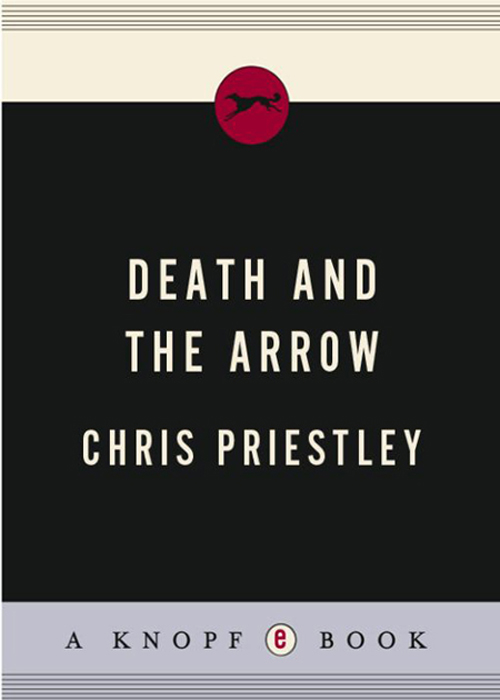
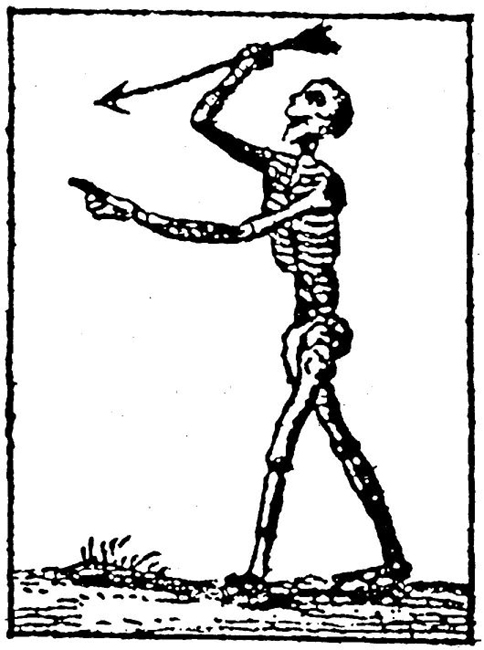
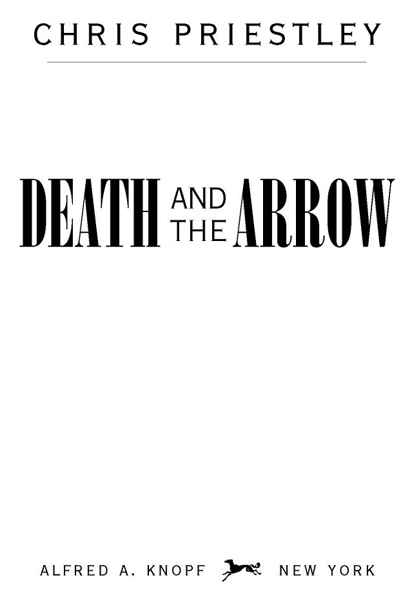
Table of Contents
For Sally
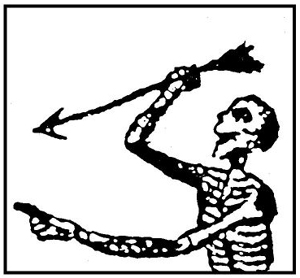
MURDER IN THE TOWN
It was an April morning in 1715. Ludgate Hill was in full flow. Carriages and carts clattered over the slippery cobbles and a thousand busy feet pounded the pavements. It was barely noon but the street was as dark as dusk, as chimney after chimney puffed and spluttered like a sailor in a gin cellar.
A surgeon sniffed at the perfumed handle of his cane, trying to rid his nose of the mortuary stink, and cheered himself with the thought that there would be a hanging tomorrow and he had been promised the corpse. An African, stolen by slavers from his native land, tried unsuccessfully to recall his people’s word for
sun
. A red kite flew across the smoke-stained sky, trailing the bloody proceeds of a scavenging trip to Smithfield market. A soldier patted a sweep for luck. A wig-maker from Cheapside searched for his watch and, finding his pocket empty, shouted, “Stop, thief!” Gentlemen felt for their sword hilts, villains for their clasp knives. A constable cursed and ducked down an alleyway, but the pickpocket was long gone.
Hawkers of every kind called out, “Oranges!” and “Oysters!” and “Won’t you buy my . . .” this or that, until the air was filled with their deafening jabber and you could not tell who was selling milk and who was selling mousetraps.
And there, in the midst of all this, was Tom Marlowe, fifteen years old, an apprentice at his father’s print shop under the sign of the Lamb and Lion in Fleet Street. Mr. Marlowe printed all manner of things: posters and pamphlets, sermons and ballads—even the “Last Dying Speeches” of the condemned.
Tom was taking a bundle of proofs of a scientific pamphlet to Dr. Harker at his coffee house, The Quill, in St. Paul’s churchyard. The new cathedral towered above, its stonework still stark and soot-free, its great lead dome visible for miles around. Tom’s father hated it. “A dome?” he had said when it was finished. “Are we Italians? No! A spire, Tom, a tower—that’s England, boy.”
Tom, on the other hand, thought it the most amazing thing he had ever seen and never tired of looking at it.
Warm air swept over him as he opened the coffee-house door. A couple of the customers rustled their newspapers, irritated by the intrusion. Dr. Harker was in his usual place over by the fire.
“Tom, lad,” he called, and motioned with his cane for Tom to come and join him. “A bowl of chocolate for my young friend! Sit yourself down, lad. How’s your father, Tom?”
“He’s well, thank you, Dr. Harker.”
Dr. Harker was Tom’s favorite of all his father’s customers and the doctor was, in his turn, very fond of the young apprentice. The doctor’s own son was a navy man; he was away at sea most of the time and showed little interest in his father or his work when he was home. “What is the point in knowing more than you
need
to know?” asked the son on his last visit. “But I
need
to know
everything
!” answered the father. They were a puzzlement to each other.
But Tom could listen to the doctor all day long. He was so clever—“stuffed full of learning,” Mr. Marlowe called him—and he had done so much. In his younger days, he had sailed to the Americas and Africa, and he had dozens of cabinets chock-full of the curiosities he had found there. When he talked, he would wave his arms in the air, as if trying to catch the visions he was conjuring up for his young friend, and the curls of his periwig would shake, dusting his coat with powder.
It was magical for Tom. He had never done anything or been anywhere. His life was as dull as the Fleet ditch, or so he felt, and looking into Dr. Harker’s life was like looking into a sparkling jewel box.
“Another brandy,” said a voice to their right, “to warm these old bones of mine.” It was the Reverend Purney, the chaplain of Newgate jail. He nodded over at Tom, took out his long clay pipe, and flashed his yellow teeth; Purney was another of Mr. Marlowe’s clients.
“It would take a gallon of brandy to warm that hypocritical old buzzard,” whispered Dr. Harker. “Do you know what
hypocritical
means, Tom?”
“No, sir, I don’t,” replied Tom.
“And long may it remain so,” said Dr. Harker with a grin. “Long may it remain so.”
At that moment, a youth burst in with an armful of newspapers. “Murder in the town!” he shouted to no great effect, for murders were all too common in these violent times. “
Extraordinary
murder!” he called, perhaps a little disappointed at the response.
“How so?” called a wag by the window. “Have they caught the murderer, then?” The coffee-house clientele erupted into laughter.
“Beskewered by an arrow right through his heart,
that’s
how so!” replied the youth. He had their attention now.
“An arrow?” said Dr. Harker quietly to no one in particular. “Now, that
is
rather unusual.”
“It’s the work of the Mohocks, I’ll be bound!” said the Reverend Purney, and there was a grumbling of agreement. The newspapers had been full of horror stories about the gang of upper-class thugs.
“I think not,” said Dr. Harker.
“Oh?” said Purney. “And why not? They name themselves after savages and behave like savages. Murder with arrows would seem a logical step.”
“What difference does it make?” said a young man nearby. “With lords for fathers and uncles in the government, they’re never going to be chatting to you in the Condemned Hold, now are they, Reverend?”
Several people nodded and said, “That’s right,” but Dr. Harker ignored this diversion.
“The Mohocks cannot be ruled out, I agree. But we need more information. Do you have any other facts for us, lad?” he called to the youth.
“I do, sir! There’s witnesses that say that this here skewered gent runs past them seconds before the deed, and on into a courtyard with no way out but locked doors—locked, mark you. They follows him and finds him nailed . . . but not another soul in sight! Not a sparrow, not a tick.” A murmur ran round the room.
“But there’s more,” said the youth, pointing his finger at no one in particular. “It turns out that this here stiff was dead already.”
“Dead already?” said Dr. Harker. “What do you mean?”
“Well, sir,” replied the newspaper boy, smiling now that he had his audience in his grip, “this here corpse— Leech was his name—he was a soldier-boy, fighting the French in the Americas, God save the King.”
“Yes, yes,” said Dr. Harker impatiently. “To the point, lad!”
“Well, it’s like I was just saying. A military man, he was, and paid the price. Cut down by heathen savages. Murdered by Indians out in the Americas while he was fighting the French some years ago!” Tom’s eyes widened.
“What?” said Purney. “Impossible!”
“Killed him dead, they did, and all the men with him.”
“Then there must be a mistake,” said the owner of the coffee house. “The murdered man must be someone else.”
“No, sir. No mistake. His own mother lives not a spit away and verified him with her own teary eyes. His sergeant come down and did the same. There ain’t no mistake.”
The customers began to mutter to themselves and mumble asides at their neighbors, but the newspaper boy held up his hand. “And ask me how the Indians killed him. Go on, ask me.”
“Shot by arrows?” suggested Dr. Harker.
“Arrows it was,” said the youth. The customers gasped and turned to the doctor in amazement.
“Come now,” he said with a shrug. “It hardly took a genius to divine that if he had been killed by natives, they might use bows.” Even so, Tom noticed Dr. Harker turned back to the newsboy with a contented smile. “Is there more?” he asked.
“There is,” the newsboy continued. “In his pocket they finds a card—a calling card, if you like. And you ain’t never going to guess what was on it!”
There was a long pause—rather too long—and Dr. Harker was forced to break the silence by saying, “I rather fear that we won’t. Could you do us the enormous favor of telling us?”
The coffee house filled with laughter again and the newsboy blushed. “In his pocket they finds a card,” he repeated, “and on that card there’s an embellishment— a figure of Death, no less, pointing one bony finger and looking like to chuck an arrow with the other hand. Now, gents, tell me if that ain’t a story or what?”
Even the sour-faced Reverend Purney had to admit that it was quite a story—though one could not always believe what one heard or even what one read in the newspapers. He reminded the customers—again—that he had once heard a report of his own body being found floating in the Fleet. Everyone nodded and smiled, but several customers secretly hoped to see that report proved true.
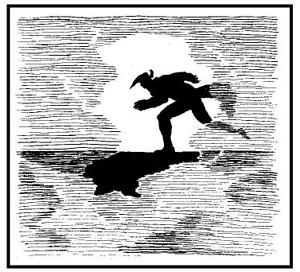
FOG
By the time Tom left the coffee house, a thick, sulfurous fog had taken hold of the city. It was the queasy color of curdled milk and it gripped his throat like a thief. He could see almost nothing in the murk and kept to the wall, dodging the other poor citizens as they coughed their way blindly toward him. He could hear the muffled clatter of horses’ hooves and the
tick, tock
of walking sticks and boot heels; somewhere in the distance, cattle were lowing as they made their way to market, and the smells of baking bread, fish, coffee, and horse dung competed with the rotten-egg stink of the fog.
Tom had no fear of getting lost—he could make this journey blindfolded—but he kept up a brisk pace nonetheless, thinking all the while about arrows and Indians and murdered men. But most of all, he thought about that hideous figure of Death and shivered to his bones.
In this state of mind, Tom could be forgiven for letting out a shriek when a hand reached out from a doorway and almost pulled him off his feet. There was a peal of rough laughter and then a cough like nails shaken in a rusty pot. It was Will.
Whenever Tom went out on business these days, his father shouted, “And mind who you’re talking to, lad!” And though no one was mentioned by name, they both knew that it was Will who Tom’s father had in mind.
Mr. Marlowe thoroughly disapproved of Will and would fly into a rage at the mere mention of his name. He could not understand what a lad like Tom could possibly want with the company of such a rogue as Will. And a rogue he certainly was.
“Why can’t you just say hello like everyone else?” said Tom, smiling now.
“What’s with the screaming, Tom? I thought for a minute I’d grabbed a Frenchman by mistake!” Will wheezed and spat on the ground.
“Very funny, Will, very funny. I wonder you don’t get yourself a booth at Bartholomew Fair and make yourself some
honest
money, you being such a clown and all,” said Tom, giving Will a shove in the arm.
“Now, now—no need for that. But you won’t rile me, Tom, for I’ve had a good day.”
“Give it back,” said Tom with a sigh.
“What?” pleaded Will. “I ain’t done nothing.”
“The watch, Will. Hand it over.”
“I don’t believe it! There’s no way you could’ve felt it. How come you knew, Tom? How? I’m a master, I am. I could take the ring from a bull’s nose, with him none the wiser. I just can’t see how you could’ve felt that—I just can’t. . . .”
Will muttered away to himself and kicked out at the wall. Tom had felt nothing—Will was every bit the master of his art he claimed to be—but he had taken to picking Tom’s pocket every time they met. Now Tom merely guessed and heartily enjoyed the effect it had on his friend.
Will handed back the pocket watch. A grin suddenly shone out from his grimy face. “Come on.” And so the two of them walked on together through the fog, each, as usual, fascinated by the other’s very different life, with Tom recalling, yet again, the part his pocket watch had played in their first meeting. . . .
Their friendship had begun one August a couple of years before, at Bartholomew Fair in Smithfield. Tom loved the fair. There was just so much to see: jugglers and fire-eaters, tightrope walkers and conjurors; there were Gypsies too, like parrots come to rest among sparrows, with their gold earrings and rainbow clothes.
Tom had been standing at the edge of the fair, listening to a strange character dressed in sackcloth preaching about the end of the world, when he heard a commotion behind. He had turned just in time to see a driverless horse and carriage rushing toward him.
He had not even had time to call out before he was knocked off his feet; he hit the pavement with a winding thud. But he had not been mown down by the horse or the carriage; he had been pushed out of their path and into a side alley.
Tom looked up at the dirty face of his savior. “Y-you saved my life,” he stammered.
“You know, I reckon you might be right at that,” said the lad with a grin. They got to their feet and dusted themselves off.
Tom held out his hand and smiled. “Tom Marlowe,” he said.
“The name’s William Piggot,” said Will with a grin, “but most people call me—”
“A thieving little cockroach,” said a voice behind them.
They turned to see a tall man dressed in black looming over them, a billowing powdered wig under his tricorn hat, one hand on the hilt of his silver sword. Behind him were two other men, also dressed in black.
“Mr. Hitchin, sir—” began Will, his face a little paler under the grime.
“That’s Under-marshal Hitchin to you, scum,” said the tall man. “Make sure we are not disturbed.” This was directed at his companions, who retreated to block the entrance to the alley.
Hitchin’s sneer suddenly became a crocodile grin as he turned to Tom. “And who is this fine fellow?”
“Tom Marlowe,” said Tom a little nervously. “Of the Lamb and Lion printing house.”
“And what is a respectable lad like you doing keeping company with one of London’s most notorious divers?” Tom turned to Will, who cocked his head and shrugged. “I see that young Piggot has failed to mention his pickpocketing skills. Tut, tut, Will. Don’t be shy now.”
“Tom, I—” began Will, but Hitchin hit him hard across the side of the head with the back of his hand. Will staggered two steps back, shook his head, but made no protest.
“Now then,” said Hitchin, pushing Tom gently to one side. “If I could just ask you to stand back, Master Marlowe, we shall see what our filthy little friend has in his pockets.” He slowly put on a pair of calfskin gloves and stepped over to Will, smiling. Suddenly he grabbed the boy by the throat with one hand and began patting his clothes with the other. “Now, what have we here?” he said while pulling out a silver pocket watch and chain. He squinted at it, reading an inscription on the back: “‘For my son, Tom.’ Well, that’s strange, is it not? Your name is Will—”
“The watch is mine,” said Tom.
“Well, that explains it,” said Hitchin.
“I’ve never seen that watch in my life!” exclaimed Will.
Hitchin hit him again. Harder this time. “Tell it to someone that cares,” he growled. “Tell it to the hangman, for all I care!”
“I gave him the watch,” said Tom suddenly.
Hitchin and Will looked equally surprised. “You did what?” said Hitchin.
“I gave him the watch,” said Tom. “He saved my life just now. There must be people who saw. I gave him my watch as a reward.”
Hitchin walked slowly toward Tom and leaned forward until the tip of his nose was touching the tip of Tom’s. “And you would swear this in a court of law?”
“I would,” said Tom, edging back a little.
Hitchin remained frozen for a few seconds, staring into Tom’s eyes as if looking for something hidden there. Then he suddenly stood upright, took off his gloves, and smiled. “Very well, then, Master Marlowe,” he said. “I will bid you good day.” And with that he walked away, his two men falling into step behind him.
“That was quick thinking, Tom,” said Will with a laugh. “I thought he was—”
Tom punched Will on the jaw and sent him spinning toward the wall.
“What’s this?” said Will, rubbing his jaw. “Do I look like I enjoy being smacked?”
“You stole my watch, you thief,” said Tom, fists clenched.
“Thief I am,” said Will, “but I never stole your watch, you muffin. And don’t think about giving me another tap or I shall have to black your eye.”
“I suppose it just hopped into your pocket on its own, did it?” shouted Tom.
“It didn’t have to,” said Will. “It had Hitchin to give it a leg up, didn’t it?”
“What are you talking about? How could Hitchin—?”
“Think about it,” said Will. “When Hitchin eased you out of the way, that’s when he made the dive. He’s not bad, neither. I felt him make the drop into my pocket, but then it’s bread and butter to me. I’ve had more practice.” He put a hand to his chest. “Look, I swear on my mother’s grave. I didn’t take your watch, Tom.”
“But why?” said Tom, fists still clenched. “Why would Hitchin try to get you hanged?”
“Because he’s a villain, Tom. They call him a thief-taker, but he’s a bigger crook than any he brings in. He has half the pickpockets in London on a leash. He gets them to rob such and such a gent and then charges the selfsame toff a finder’s fee for returning the goods. He’s been trying to get me to work for him for ages. He’s just letting me know he can get me dangled any time he likes. But I’m my own man.”
Tom stared at him and then looked away toward the end of the alley. His hands relaxed.
“I swear, Tom,” said Will. “I never took your watch. I ain’t no liar.” Will smiled a crooked smile. “Well, not at this particular moment anyways.”
Tom laughed. Will held out his hand and Tom shook it.
“Come on,” said Will. “Let’s get out of this stinking alley.”
“I suppose your mother
is
dead?” said Tom, remembering Will’s oath.
“As a hangman’s heart,” replied Will.
“Mine too,” said Tom.
Will stopped and slapped Tom in the chest with the back of his hand. “Then ain’t we like brothers in a way?”
“Yes,” said Tom. “I suppose we are.”
And so, in a way, they had been since that day.
They were an odd couple, but well matched in many ways. Each had a ready wit and a quick temper and both, as young boys, had lost their mothers, which left them with a sadness and an unspoken yearning for something more than they had.
Physically they were very different, though, with Tom black-haired and stocky, and Will blond and skinny as a whippet. Unlike Tom’s, Will’s clothes were shabby and often much too big for him, emphasizing his slight frame. And he was always in need of a wash that never seemed to come.
Tom talked about his father and the print shop and Dr. Harker. Will loved to hear of the doctor’s travels, for just like Tom, he had yet to travel five miles from the house in which he was born. For his part, Will gave a watered-down account of his life as a member of London’s army of pickpockets and petty thieves.
“As it happens,” said Will, suddenly remembering their conversation, “I don’t need your poxy watch, Tom, for I have a rather splendid one of my own. Now, let me see—what is the time?” With a theatrical flourish, he produced a beautiful gold watch and chain—the very same watch the Cheapside wig-maker had searched for in vain earlier that day.
“Will! For God’s sake! Put it away!”
“All right, calm down, Tom,” Will replied, hiding the watch inside his coat. “Don’t have a seizure! There’s no one to see us in this fog. Don’t get so flustered.”
“Don’t get so flustered? You could swing for that— and me along with you for not speaking up!”
“No one’s going to swing, Tom, though it’s good to hear you won’t be peaching on me. . . .”
“It’s not funny, Will. You’ll be picking the hangman’s pocket one day.”
“Well, you’re in a cheery mood today,” said Will a little crossly. “You know what I am—what I does. Don’t come the parson with me, Tom.”
They both looked down at the ground in front of them and waited for the other to speak. As usual in these situations, it was Will who broke the silence.
“Well, as it happens, Master Marlowe, I happen to have gone and got meself a job.”
“You?”
gasped Tom.
“Yes, me, you cheeky rogue,” said Will, sounding a little hurt.
“Sorry, Will. That’s great news, really it is. I was just a little, well,
surprised,
is all.”
“Yeah, well. I got feelings too, Tom. Lots of ’em.”
“I know, Will, honest I do. Tell me about it. What is the work exactly?”
“Well,” said Will, puffing himself up a little, “I happen to be in the employ of a certain gent I know who has paid me to perform certain very delicate duties.”
“Hmm,” said Tom, raising an eyebrow. “It is
honest
work, isn’t it, Will?”
Will grinned broadly and slapped Tom on the chest with the back of his hand. “Listen to you. You are such a worrier, Tom. But I can’t talk about it, not even to you. Sworn to secrecy and all that.”
“Will . . .”
“I’ve got to go, Tom. We’ll talk later.” And with that Will set off toward the City.
“Will!” called Tom. “Is it honest?”
Will had all but melted into the fog and was a vague and pale sketch when he turned to call back to Tom. “You could say it’s the
opposite
of what I normally do!” Then he turned and, with a little hacking laugh, disappeared like a ghost at dawn.
Tom was trying to make some kind of sense of what Will had said when a breeze blew in from the Thames and cleared a patch of fog, allowing the houses on the other side of the street to come briefly into view.
Within an instant, the fog had closed back in, but in that instant Tom could have sworn he saw someone running along the roof ridge of one of the buildings. He waited to see if the fog would shift again, but it seemed set. Tom shook his head. Maybe he was starting to imagine things.